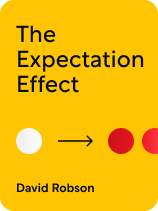

This article is an excerpt from the Shortform book guide to "The Expectation Effect" by David Robson. Shortform has the world's best summaries and analyses of books you should be reading.
Like this article? Sign up for a free trial here.
What is your relationship like with food? Do you have a healthy food attitude?
Food is essential for your health and often plays a significant cultural role as well. There’s no reason that you should have a negative attitude about it.
Below we’ll look at ways you can improve your relationship with food, according to The Expectation Effect by David Robson.
Responses to Food
Expectation effects play a role in how your body responds to food. Robson explains that your food attitude determines whether you enjoy your meals, feel full after eating, and maintain a healthy weight over time. That’s because your mindset about food influences your physiological response. A feeling of enjoying your food rather than depriving yourself for the sake of health makes a difference. If you eat a healthy meal and expect that it won’t fill or nourish you, that prediction comes true: Your body may not absorb the nutrients, and you may feel hungry again soon after eating.
(Shortform note: There are many reasons to think that the specific foods you’re eating aren’t the only important factor in your diet. In Fast. Feast. Repeat., Gin Stephens contends that there’s no such thing as an optimal diet for everyone because we all respond differently to the same foods. By acknowledging that there’s no perfect diet, you can stop punishing yourself for eating “bad” foods—one way that you might adopt a more positive mindset toward food.)
To improve your attitude toward food, Robson recommends making the following changes:
1. Choose Meals That Feel Satisfying
First, even when you’re focused on eating a healthy diet, make a point of eating meals that feel decadent and satisfying, even when they’re healthy so that you’ll feel full longer and your brain increases your metabolism. If you eat meals that you perceive as having fewer calories or being less satisfying, your body reacts accordingly and burns less energy, as if you really are depriving yourself of needed nutrients.
(Shortform note: Researchers have found that we tend to overeat not when our food is delicious, but when it’s not delicious enough. After you eat a meal that tastes fine, but not amazing, you’re probably still thinking about the food you wish you’d eaten instead. But if you eat something indulgent and delicious, you’re more likely to feel satisfied with a smaller meal and less likely to feel hungry soon after. Scientists say that your body can adjust its metabolic rate and adapt how it spends the calories you consume, so it follows that how you perceive your food could affect how your body responds to it.)
2. Eat Mindfully
Next, Robson recommends that you put distractions aside at meals. Researchers have found that if you’re distracted while eating, you’re less likely to feel full and more likely to overeat: When you don’t pay attention to your food, you don’t signal to your brain that you should feel full after eating.
(Shortform note: In In Defense of Food, Michael Pollan explains that when you allow senses beyond taste to guide what you eat and how much you eat, you’re more likely to consume healthy portions. For example, when you eat a French ham and cheese sandwich, you might notice the sound of the baguette crunching, the smell of the ham and Gruyère cheese, and the color of the butter against the bread. Eating slowly can also give your brain time to register that your stomach is full: It takes about 20 minutes for that signal to be transmitted.)
3. Anticipate Your Meals
Finally, savor the anticipation of food. Scientists have found that people who imagine the taste, smell, and texture of a dessert before eating tend to choose smaller portions. By anticipating the food, they realize that they only need a few bites to enjoy the dessert. (Shortform note: In addition to helping you control what you eat, anticipation can help you enjoy things more. Psychologists say that anticipating the good things in your future also makes you feel good in the present and can help you feel more motivated, optimistic, and patient.)

———End of Preview———
Like what you just read? Read the rest of the world's best book summary and analysis of David Robson's "The Expectation Effect" at Shortform.
Here's what you'll find in our full The Expectation Effect summary:
- Why you should rely on your body, not the universe, to make you happier
- How your brain can control your health, longevity, and quality of life
- Why you should focus on the benefits of getting older, rather than fearing it






